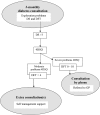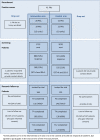Lessons learnt from a cluster-randomised trial evaluating the effectiveness of Self-Management Support (SMS) delivered by practice nurses in routine diabetes care
- PMID: 26112220
- PMCID: PMC4486946
- DOI: 10.1136/bmjopen-2014-007014
Lessons learnt from a cluster-randomised trial evaluating the effectiveness of Self-Management Support (SMS) delivered by practice nurses in routine diabetes care
Abstract
Objective: To evaluate the effectiveness of biopsychosocial Self-Management Support (SMS) delivered by practice nurses in routine diabetes care.
Design: A pragmatic cluster-randomised controlled trial within a hybrid effectiveness-implementation study design. Practice nurses were cluster-randomised.
Setting: A regional care group in the Netherlands consisting of 77 family practices. The study involved practice nurses (n=40) providing care to approximately 4000 patients with diabetes.
Participants: Patients with type 2 diabetes (n=264) selected by a self-administered questionnaire aimed at measuring emotional distress and diabetes-related reduced daily functioning.
Intervention: Practice nurses in the intervention arm (n=19) were trained to integrate SMS into their routine consultations. SMS included detection of patients with emotional distress and reduced daily functioning, and supporting them when needed through problem solving and reattribution techniques. Practice nurses in the control arm (n=21) provided usual care.
Main outcome measures: The primary outcome measure was a dichotomised score on a Visual Analogue Scale that measured the perceived effect of diabetes on daily functioning. Secondary measures included patients' diabetes-related distress, quality of life, autonomy and participation, self-efficacy, self-management and glycaemic control. Outcomes were measured at baseline and at 4-month and 12-month follow-ups.
Results: Only 16 of the 117 patients in the intervention arm (14%) who were found eligible by the posted research-driven screening questionnaire were detected by their practice nurses. Extra consultations for the self-management support were delivered to only 11 study participants. In the control arm, 147 patients received usual care. Multilevel analyses showed no significant differences in outcomes between the intervention and control arms.
Conclusions: SMS in its present form was not effective. The research-driven screening to select trial participants appeared to be inconsistent with nurse-led detection in routine practice. Adequate follow-up moments need to be built in to overcome barriers resulting from tension between the implementation and effectiveness parts of hybrid studies.
Trial registration number: Current Controlled Trials NTR2764.
Keywords: PRIMARY CARE; PUBLIC HEALTH.
Published by the BMJ Publishing Group Limited. For permission to use (where not already granted under a licence) please go to http://group.bmj.com/group/rights-licensing/permissions.
Figures


References
Publication types
MeSH terms
Associated data
LinkOut - more resources
Full Text Sources
Other Literature Sources
